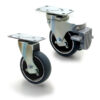Guide to Writing a Successful Computer Science Research Project
The computer science field is dynamic and exciting, and one that is often experienced through the practical, hands-on experience of working with computers. Because the nature of computer science is based in coding, math, and technology, many students face enormous challenges when they are asked to step back from the practical realities of computer science to explore the discipline at a more abstract level, namely through a research paper. Fortunately, there are a few things you can do to help yourself get a leg up on the research writing process for your next computer science paper.

The first thing to remember is that a computer science research paper is a lot like any other research paper in any subject. That means that your paper will be made up of all the same parts as any other research project.
Generally speaking, these include:
- Title Page – Listing the title of your paper, your name, and other pertinent data.
- Abstract – A brief summary of your paper in one-paragraph form.
- Introduction – The opening to your paper, seeking to gain the audience’s attention and draw them into the paper, culminating in a thesis statement.
- Thesis Statement – A single sentence describing the main idea of the paper and explaining what it intends to demonstrate or prove.
- Body Paragraphs – The main part of the paper, in which you support your thesis by presenting the evidence you gathered during your research process and what it means.
- Conclusion – A summary of the main ideas of the paper with a parting thought telling the reader what it means and leaving them with something to think about for the future.
- Reference List or Bibliography – An alphabetical listing of sources used in the creation of the paper.
- Appendix – Some research papers require appendices to present data or documents used in the creation of the paper. For example, a scientific research paper might have an appendix presenting the raw data gathered by the author for analysis.
But while the parts of a research paper are the same from subject to subject, computer science research papers tend to be a little different because they require a higher level of technical skill to complete.
When you are writing an original research paper in computer science, you will likely need to present mathematical data or samples of code to support and defend your thesis. This can require special characters that can be difficult to display with standard word processing software, so be sure that you are familiar with your program’s methods of displaying special characters and of creating block quotations and tables for the display of such information.
Beyond the practical aspects of developing a paper, computer science research papers have a few other challenges that students need consider before they start writing. Students writing computer science research papers should be sure that they are familiar with the academic literature on their subject. It can be tempting to rely on Google, or even Google Scholar, for information, but an academic library is the best choice for finding scholarly sources and surveying the current state of a rapidly changing field. Additionally, research papers in computer science tend to follow trends, which means that some topics become wildly overused and can lead to unoriginal or repetitive papers. In recent years, topics such as artificial intelligence and robotics, computer-assisted education, the P vs. NP problem, and quantum computing have all seen their moment in the sun, and there are an enormous number of papers on these topics. By knowing the current trends in research, you can find a more original topic that is more likely to make your paper stand out from the pack and get you noticed.
Most important of all: Relax! You’ve got this.
With a little prep work and some carefully research, you can create a powerful and effective computer science research paper. All you have to do is put in the time and the work, and you’ll come out the other side with a great research paper every time.










